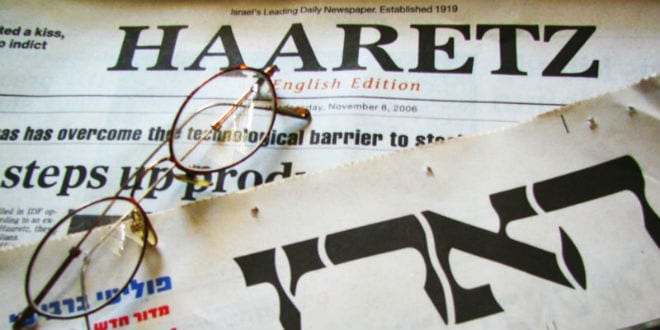In its editorial on Monday, the Israeli daily Haaretz called Yamina Party chairman Naftali Bennett’s efforts to form a national-unity government “cause for optimism.”
Lest loyal readers of the far-left newspaper gasp at the mere suggestion that any move made by Bennett should be seen in a positive light, they can relax. Where the attempt to “put an end to the toxic regime of [Prime Minister] Benjamin Netanyahu” is concerned, siding with an ideological nemesis is rendered kosher.
To ensure that no more of their dwindling subscriptions are canceled, Haaretz justified the softening of its stance towards a figure it used to trash as a dangerous fanatic by invoking the pragmatism card. This method enabled it to launder other political foes—unofficial Yamina co-chair Ayelet Shaked, New Hope Party leader Gideon Sa’ar and Yisrael Beiteinu chief Avigdor Lieberman—each of whom it usually describes as individual and collective stains on liberal thought.
As if to commiserate with its audience, the editorial stressed that nobody on the left “has any illusions” about the above right-wingers. Indeed, it acknowledged, “The ideological gaps between the people of the center-left … and Bennett, Shaked, Sa’ar, Lieberman and their colleagues are fundamental and considerable.”
Nevertheless, the editorial stated, “We must hope that Bennett and Yesh Atid’s Yair Lapid succeed in their mission to enlist them all to a unity government … because it’s critical to end the rule of a criminal defendant who knows no restraint and who puts himself before the state.”
But that’s not the only reason to wish for such a coalition, according to Haaretz. More importantly, if said government is formed, it will include Yesh Atid, Labor, Meretz and Blue and White, with the backing of Ra’am and maybe even some members of the Joint Arab List. This, claimed the editorial, is “good and hopeful news” in spite of the “right-wing views” of Bennett, Shaked, Sa’ar and Lieberman.
The group in question, the editorial said, shares positions on “annexing the territories and the solution to the conflict with the Palestinians, and thinks similarly about Israeli policy toward the Gaza Strip and Hamas. The four are convinced of the need for a judicial revolution, believe that the state should be tough on asylum-seekers, identify with the so-called nation-state law and are hostile to human-rights organizations—everything that must be fought in normal times.”
Never mind that this depiction of the Israeli right, lacking in all nuance, discredited the majority of the electorate in one fell swoop of customary snobbery. Haaretz is a publication for insulated bubble-dwellers who bask in what they believe to be their intellectual and moral superiority.
As such, the editors needed to explain how it is possible to favor a government ruled by and containing people whose positions “must be fought.”
Their answer to the eyebrow-raisers: “[T]hese are not normal times. Israel needs political change like it needs air to breathe. After 12 straight years of the Netanyahu regime, three indictments and four elections in the past two years, Israel deserves a prime minister who is free to address national issues full-time, not only when he is not in court … [one] who does not undermine the systems of the state and incite against its institutions in order to evade justice … who acts for the benefit of the citizens rather than setting them against each other.”
In conclusion, they wrote, “Israelis deserve a government that focuses on them, on their welfare, on solving their problems and thinking about their future, rather than being devoted entirely to ensuring the future of Netanyahu and his family. We can no longer allocate resources, subordinate the legal system, distort the ruling structure, dedicate public energies and exhaust the public’s attention for the benefit of one man. The shared recognition that Netanyahu is harming the state, its institutions and its social fabric is the basis for the growing unity among the right, the center and the left. At this stage, it is the best option for Israel.”
Encountering this and similar editorials in the Hebrew press, a stranger to Israeli politics would not know that Netanyahu’s party won far more seats on March 23 than any of its competitors. Nor would such a person realize that every poll that measures suitability for the premiership puts Netanyahu at the top.
The focus on his inability to form a government in the past two years, despite his repeatedly garnering a majority of the mandates, is also a fallacy since he did join forces a year ago with Blue and White Party leader Benny Gantz to establish the “national emergency” coalition, created mainly to combat the coronavirus crisis.
That it failed should serve as a lesson to Haaretz and anyone else praying for a “bloc of change” coalition—made up of a mixture of diametrically opposed parties—is delusional. If it manages to get off the ground, it will collapse in a very short time, requiring the fifth round of elections that voters and politicians are insisting must be avoided.
The truth about the current situation is fourfold. For one thing, as Haaretz noted, Netanyahu has been in power for a dozen years (15, when counting his stint from 1996 to 1999).
Secondly, regardless of his vast accomplishments, which the paper omits due to its rejection of them—keeping Tehran at bay, building a flourishing macro-economy, forging peace deals with Israel’s anti-Iran Arab neighbors and waging the world’s most enviable COVID-19 vaccination campaign—some of the public is experiencing weariness at the length of his tenure.
Paradoxically, however, as the fervor among his detractors grows, so does the enthusiasm of his fans. This is another element conveniently missing in most analyses these days.
The going mantra, then—that if only Netanyahu would step aside and let somebody else take the reins of the Likud, a stable, right-wing government could be had in a flash—is not at all certain. In addition, it runs counter to the results of the last party primary, which he won by a landslide. The naysayers bemoaning the “demise of democracy” ought to ponder that for a moment.
Third, Netanyahu’s history of personal rivalries with Bennett, Shaked, Sa’ar and Lieberman may have finally come back to bite him irredeemably. His reportedly imminent offers to Bennett and Sa’ar to go first in a rotation in the Prime Minister’s Office will give some insight into whether or not this is the case. On the other hand, every trial balloon flown during coalition negotiations could be seen as a ploy ahead of a potential, if not likely, fifth election.
Finally, even Netanyahu’s enemies grudgingly acknowledge his gravitas. As one member of Meretz recently said (in private, of course), “Our trouble isn’t with our ideology; it’s that we don’t have an equivalent of Bibi on our side.”
This is the same Meretz, by the way, whose chairman, Nitzan Horowitz, stated unabashedly in March that there was “room” for the International Criminal Court’s decision to investigate Israel for war crimes. It’s a party that would be included in the national-unity government prescribed by Haaretz.
Though it’s false that Meretz’s ideology isn’t the problem—after all, it’s precisely the post-Zionism of the left that has been defeated time and again at the ballot box—the realization that it doesn’t have anyone in Netanyahu’s league is accurate. And everybody knows it, including Haaretz.
Reprinted with author’s permission from Jewish News Syndicate





